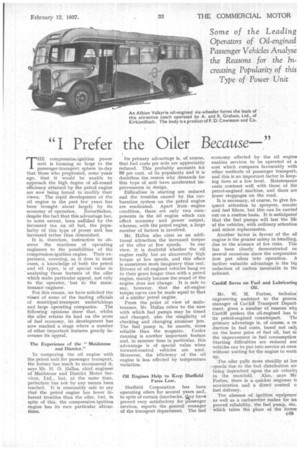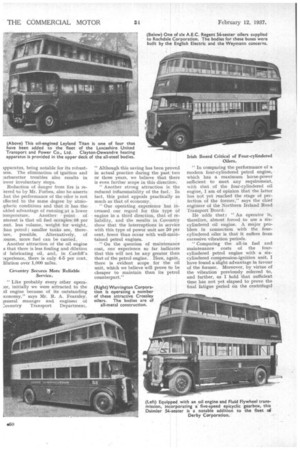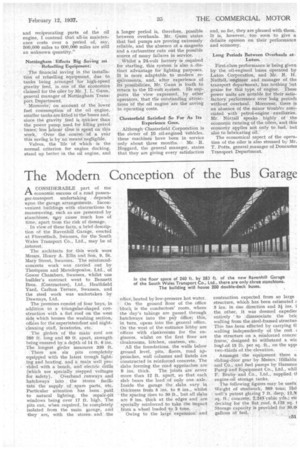"I Prefer the Oiler Because T HE compression-ignition power unit is
Page 99

Page 100

Page 101

If you've noticed an error in this article please click here to report it so we can fix it.
looming so large in the passenger-transport sphere to-day that those who prophesied, some years. ago, that it would be unable to approach the high degree of all-round efficiency attained by the petrol engine are now being forced to modify their views. The rapid development of the oil engine in the past few' years has beenbrought • about largely by its economy of operation. Nevertheless, despite the fact that this advantage has, to some extent, been nullified by the increased tax on oil fuel, the popularity of this type of power unit has increased rather than diminished.
It is, therefore, instructive to observe the reactions , of operating engineers to the possibilities of the compression-ignition engine. Their experience, covering, as it does in most cases, a knowledge of both the petrol and oil types, is of special value in analysing those features of the, oiler which make particular appeal, not only to the operator, but to the maintenance engineer.
For this reason, we have solicited the views of some of the leading officials of municipal-transport undertakings and large operating companies. The following opinions show that, whilst the oiler retains its lead on the score of fuel economy, its development has now reached a stage where a number of other important features greatly increases its appeal.
The Experience of the " Maidstone and District."
In comparing the oil engine with the petrol unit for passenger transport, the former has much to recommend it, says Mr. Ff. 0. lianas, chief engineer of Maidstone and District Motor Services, Ltd., but, at the same time, perfection has not by any means been reached. It is reasonably safe to say that the petrol engine has fewer inherent troubles than the oiler, but, in spite of this, the compression-ignition engine has its own particular attractions. Its primary advantage is, of course, that fuel costs per mile are appreciably reduced. This probably' accounts for 99 per cent. of its popularity and it is doubtless the reason why demands for this type of unit have accelerated improvements in design.
Difficulties in starting are reduced and the troubles caused by the carburation system on the petrol engine are eradicated. Apart from engine condition, there are only two components in the oil engine which can affect economy and power output, whereas, with the petrol engine, a large number of factors is involved.
Mr. Hellas also cites as an additional attraction the increased torque of the oiler at low speeds. In our view, it is doubtful whether the oil engine really has an abnormally high torque at low speeds, and this effect is sometimes more imaginary than real. Drivers of oil-engined vehicles hang on to their gears longer than with a petrol engine, mainly because the sound of the engine does not change. It is safe to say, however, that the oil-engine torque curve can be made equal to that of a similar petrol engine.
From the point of view of maintenance, Mr. Hallas refers to the ease with which fuel pumps may be timed and changed. also the simplicity of checking and changing atomizer jets. The fuel pump is, he asserts, more reliable than the magneto. Cooler running is another important feature and, in summer time in particular, this advantage is of special value when forward-control vehicles are used. Moreover, the efficiency of the oil engine is less affected by temperature variation.
Oil Engines Help to Keep Sheffield Fares Low.
Sheffield Corporation has been operating oilers for several years and, in spite of certain drawbacks, t.liey have proved very satisfactory for Iiissenger services, reports the general manager of the transport department. The fuel economy effected by the oil engine enables services to be operated at a cost which compares favourably with other methods of passenger transport, and this is an important factor in keeping fares at a low level. Maintenance costs contrast well with those of the petrol-engined machine, and there are fewer stoppages on the road.
It is necessary, of course, to give frequent attention to sprayers, nozzles and fuel filters, but this can be carried out on a routine basis. It is anticipated that the fuel pumps will last the life of the vehicles, with ordinary attention and minor replacements.
Another factor in favour of the oil engine is the greater safety in handling, due to the absence of fire risks. This has been clearly demonstrated on several occasions since the corporation first put oilers into operation. A further valuable advantage is the big reduction of carbon monoxide in tilt exhaust.
Cardiff Saves on Fuel and Lubricating Oil.
Mr. W. M. Forbes, technical engineering assistant to the genera: manager of Cardiff Transport Depart. ment, gives a number of reasons wh3 Cardiff prefers the oil-engined bus tc its petrol-engined counterpart. TI•u primary advantage is, of course, a re. duction in fuel costs, based not on1.3 on the lower price of fuel oil, but or the improvement in fuel consumption Starting difficulties are reduced an vehicles can be put into service at once without waiting for the engine to warn up.
The oiler pulls more steadily at loa speeds due to the fuel distribution noi being dependent upon the air velocit3 in the manifold. Also, says Mr Forbes, there is a quicker response tt acceleration and a direct control o fuel delivery.
The absence of ignition equipmett as well as a carburetter makes for ins proved reliability, the fuel pump, etc. which takes the place of the forme ipparatus, being notable for its robustless. The elimination of ignition and :arburetter troubles also results in 'ewer involuntary stops.
Reduction of danger from fire is re:erred to by Mr. Forbes, also he aiserts hat the performance of the oiler is not tffected to. the same degree by atmoTheric conditions and that it has the idded advantage of runningat a lower temperature. Another point of nterest is that oil fuel occupies. 18 per :ent. less volume, weight for weight,. than petrol ; smaller tanks arc, thereore, possible. Alternatively, of :ourse, more fuel can be carried._
Another attraction of the oil engine s that there is less fouling and dilution )f lubricating oil, and, in Cardiff's xperience, there is only 4-5 per cent. Elution over 1,000 miles.
Coventry• Secures More Reliable Service.
" Like probably every other opera:or, initially we were attracted to the iii engine because of its outstanding xonomy," says Mr. R. A. Fearnley, general manager and engineei of :oventry Transport Department.
"Although this saving has been p 14:1 in actual practice during the past two or three years, we believe that here is even further scope in this direction,
" Another strong attraction is the reduced inflammability of the fuel. In fact, this point appeals practically as much as that of economy.
" Our operating experience has increased our regard for this type of engine in a third direction, that of reliability, and the results in Coventry show that the interruptions in service with this type of power unit are 50 per cent. fewer than occur with well-maintained petrol engines.
"On the question of maintenance cost, our experience so far indicates that this will not be any greater than that of the petrol engine. Here, again, there is evident scope for the oil unit, which we believe will prove to he cheaper to maintain than its petrol counterpart." "In comparing the performance of a modern four-cylindered petrol engine, which has. a maximum horse-power sufficient to meet any requirement, with that of the four-cylindered oil engine, I am of opinion that the latter has not yet reached the stage of perfection of the former," says the chief engineer of the Northern Ireland Road Transport Board.
He adds that: " An operator is, therefore, almost forced to use a sixcylindered oil engine. A major problem in connection with the fourcylindered oiler is that it suffers from excessive vibration periods.
'Comparing the all-in fuel and maintenance costs of the fourcylindered petrol engine with a sixcylindered compression-ignition unit, I have found a slight advantage in favour of the former. Moreover, by virtue of the vibration previously referred to, and further, as I hold that sufficient time has not yet elapsed to prove the final fatigue period on the centrifugal and reciprocating parts of the oil engine, I contend that all-in maintenance costs over a period of, say, 500,000 miles to 000,000 miles are still an ,unknown quantity."
Nottingham Effects Big Saving on Refuelling Equipment.
The financial saving in the installation of refuelling equipment, due to tanks being arranged for high-speed gravity feed, is one of the economies claimed for the oiler by Mr. J. L. Gunn, general manager of Nottingham Transport Department.
Moreover, on account of the lower fuel consumption of the oil engine, smaller tanks are fitted to the buses and, since the gravity feed is quicker than the power pump, usedfor filling petrol buses; less labour trine is spent on this work. Over the course of a year this saving is by no means negligible, Valves, the life of which is the normal criterion for engine docking, stand up better in the oil engine, and a longer period is, therefore, possible between overhauls. Mr. Gunn states that fuel pumps are proving extremely reliable, and the absence of a magneto and a carburetter cuts out the possible source of many failures in service.
Whilst a 24-volt battery is required for staffing, this system is also a .distinct advantage for lighting purposes. It is more adaptable to modern requirements, and, after experience of its possibilities, Mr. Gunn is loath to return to the 12-volt system. He supports the view expressed, by other operators, that the outstanding attrac tions of the oil engine are the 'saving . , in operating costs.
Chesterfield Satisfied So Far As Its Experience Goes.
Although .Chesterfield Corporation is the owner of 16 oil-engined vehicles, these machines have been in service only about three months. Mr. R. Hoggard, the general manager, states that they are giving every satisfaction and, so far, they are pleased with them. It is, however, too soon to give a definite opinion on their performance and economy.
Long Periods Between Overhauls at
First-class performance is being given by the oil-engined buses operated by Luton Corporation, and Mr. R. H. Nuttall, engineer and manager of the transport department, has nothing but praise for this type of engine. These power units are notable for their satisfactory performance over long periods without overhaul. Moreover, there is an absence of the minor troub!es associated with petrol-engine auxiliaries. Mr. NUttall speaks highly of the economic running of the oilers, and this economy applies not only to fuel, but
also to lubricating oil.'
The economical aspect of the operation of the oiler is also stressed by Mr. T. Potts, general manager of Doncaster Transport Department.




























































































































































